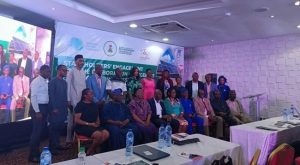The Federal Government has called for better understanding of the Long-Term Strategy for Low Emission Development (LTS-LED) ) to tackle climate change challenges.

Minister of Environment, Mohammed Abdullahi, made the call at the stakeholders meeting on the elaboration of Nigeria’s Long Term-Low Emission Development Strategy (LTS- LEDS) on Wednesday, May 17, 2023, in Lagos.
Abdullahi was represented at the event by Dr Iniobong Abiola-Awe, Director, Department of Climate Change in the Ministry of Environment.
The minister said the meeting was an important milestone in the country’s collective efforts to address the challenges posed by climate change.
“Climate Change is a reality that has come to stay and is having disproportionate negative impacts around the globe,” Abdullahi said.
He said that climate change was no longer an environmental issue. Abdullahi said climate change had been scientifically proven and understood as a political, economic, and social issue.
The minister, however, noted that, with affordable and scalable solutions, climate change challenges would be turned into opportunities.
“There is a growing recognition that affordable, scalable solutions are now available that will enable us all to leapfrog to cleaner, more resilient societies and economies, hence turning the challenges of climate change into opportunities.
“Nigeria’s commitment to the low-carbon pathway is evident in the ratification of the Paris Agreement as outlined in its Nationally Determined Contributions (NDCs) which can be achieved with financial assistance, technology transfer, and capacity building from the more advanced and willing international partners.
“The development of the Nigerian LTS/LT-LEDs complies with the Paris Agreement Article 4.19.
“The article invites countries to formulate and communicate ‘long-term, low greenhouse gas emission development strategies’ or Long-Term Strategies and support the achievement of low-carbon and climate-resilient societies.
“The Nigerian long-term low greenhouse gas emission development strategy builds on the commitment made by the President at COP26 in Glasgow, UK for long-term decarbonisation by 2060,” he said.
The minister said the recognition of long-term strategies would provide a pathway to a whole-of-society transformation, a vital link between the short-term NDC and the long-term objectives of the Paris Agreement.
He added that it would enable countries to avoid costly investments in high-emissions technologies.
Abdullahi listed other benefits as equitable transitions, promoting technological innovations, and planning for new sustainable infrastructure considering future climate risks.
The minister commended donor partners for their support in transition to a net zero-GHG, climate-resilient and sustainable development path, through strategies, including the sharing of resources and capacity development, among others.
He also appreciated the Natural Eco Capital Team, Deep Decarbonisation Pathway team, staff of the Ministry and other stakeholders for their usual support and contributions.
The Director Overseeing Office of the Permanent Secretary in the ministry, Mr Charles Ikeah, stated that the world is working towards achieving the long-term global goal of reducing emissions.
His words: “The world is on a pathway to global warming of 1.5C in 2021-2040 and 2C around 2050. A significant gap remains between pledged emission reductions and the reduction required to meet the long-term global goal. The emission gap must be urgently bridged in achieving net zero emissions and long-term global goals.
“Accordingly, we are expected to focus on ensuring a low carbon, climate-resilient, high growth circular economy that reduces current emission level in Nigeria and moves towards net-zero emissions across all sectors of its development in a gender responsive manner.”
In her introductory remarks, Dr Abiola-Awe disclosed that the Department of Climate Change and the National Council on Climate Change guides the development of the LTS supported by 2050 Pathway Platform and coordinated by Natural Eco Capital with the Deep Decarbonisation Pathway Team working on the quantitative aspects.
“All through the strategic development process, input from all stakeholders is sought to ensure that a participatory process is followed to co-define and ensure ownership of the LTS by Nigerians. Thus, ensure concrete and implementable strategies for Nigeria to achieve zero-emission, and different stakeholders’ engagements have been held since the inception of the elaboration of the LT-LEDS,” she added.
